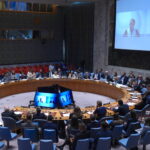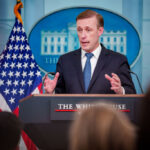The sanctions will be reinstated in 30 days; Iran could come to an agreement with the West before then
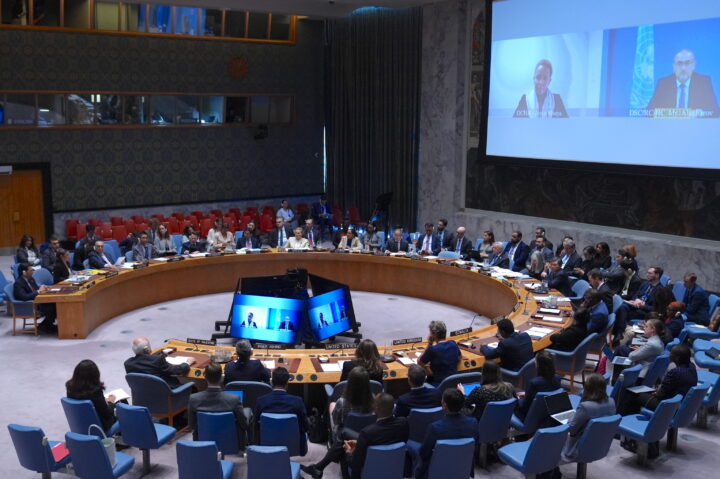
Selcuk Acar/Anadolu via Getty Images
U.N. Security Council meeting New York City on August 27, 2025.
France, Germany and the United Kingdom triggered the snapback sanctions mechanism on Thursday, to reinstate all United Nations Security Council sanctions on Iran that had been lifted since the implementation of the 2015 nuclear deal.
The European parties to the Iran deal, known as the E3, notified the UNSC that they were triggering snapback sanctions due to Iran’s continued noncompliance with its commitments under the Joint Comprehensive Plan of Action, to which they are still parties despite the U.S. withdrawal in 2018.
If the UNSC does not adopt a resolution stopping the process — which is unlikely unless Iran reaches an agreement with the West, because it would be subject to vetoes from the states triggering the sanctions and the U.S. — all of the sanctions sunsetted in the framework of the 2015 deal will be restored in 30 days.
However, the E3 said it is open to continuing negotiations with Iran during those 30 days.
The E3’s move came after its foreign ministers met with their Iranian counterpart Abbas Araghchi in Geneva earlier this week in a last-ditch effort to reach an agreement with the Islamic Republic to scale back its nuclear program. It also comes less than three months after Israel and the U.S. bombed Iranian nuclear facilities, after which U.S.-Iranian negotiations broke down.
“Since 2019,” the E3 foreign ministers’ statement reads, “Iran has exceeded JCPoA limits on enriched uranium, heavy water, and centrifuges, restricted the IAEA’s ability to conduct JCPoA verification and monitoring activities, and has abandoned the implementation and the ratification process of the Additional Protocol to its Comprehensive Safeguards Agreement. These actions contravene Iran’s commitments set out in the JCPoA and have serious implications on the capacity of Iran to progress toward developing a nuclear weapon.”
The E3 noted that it repeatedly negotiated with Iran to return to its 2015 commitments, to no avail.
“Today, Iran’s non-compliance with the JCPoA is clear and deliberate, and sites of major proliferation concern in Iran are outside of IAEA monitoring,” the foreign ministers stated. “Iran has no civilian justification for its high enriched uranium stockpile … Its nuclear program therefore remains a clear threat to international peace and security.”
Among the sanctions that would be restored are an arms embargo, a ban on Iranian uranium enrichment and reprocessing, a ban on transferring ballistic missile technology and technical assistance, a global asset freeze on targeted Iranian individuals and entities and foreign inspections of Iranian cargo planes.
The snapback mechanism was set to expire at the end of October, in accordance with the terms of the JCPOA, but Russia will assume the presidency of the UNSC in October, raising concerns in the West that it would try to delay the 30-day snapback process. As such, the E3 set a deadline for the end of August for Iran to make progress in rolling back its nuclear program.
In 2020, two years after the U.S. left the JCPOA, the first Trump administration attempted to trigger snapback sanctions, but the other parties argued that it was no longer entitled to do so.
Iran’s Foreign Ministry said that it “categorically reject[s] and condemn[s] in strongest terms the unlawful notification by the E3 to the UNSC … This escalation will severely undermine the ongoing process of engagement between Iran and the International Atomic Energy Agency. It will be met with appropriate responses.”
Secretary of State Marco Rubio said the U.S. supports the E3’s move and called it “a direct response to Iran’s continuing defiance of its nuclear commitments.”
“At the same time,” Rubio said in a statement, “the United States remains available for direct engagement with Iran … Snapback does not contradict our earnest readiness for diplomacy, it only enhances it.”
Israeli Foreign Minister Gideon Sa’ar posted on X that “even after Israel and the U.S. operation against Iran’s nuclear program, Iran hasn’t abandoned its desire to acquire a nuclear weapon. This is why the E3’s move to initiate the return of UN sanctions on Iran is inevitable. It is an important step in the diplomatic campaign to counter the Iranian regime’s nuclear ambitions.”
Reports indicate the move could come as soon as Thursday, after talks in Geneva ended with little progress on rolling back the Iranian nuclear program
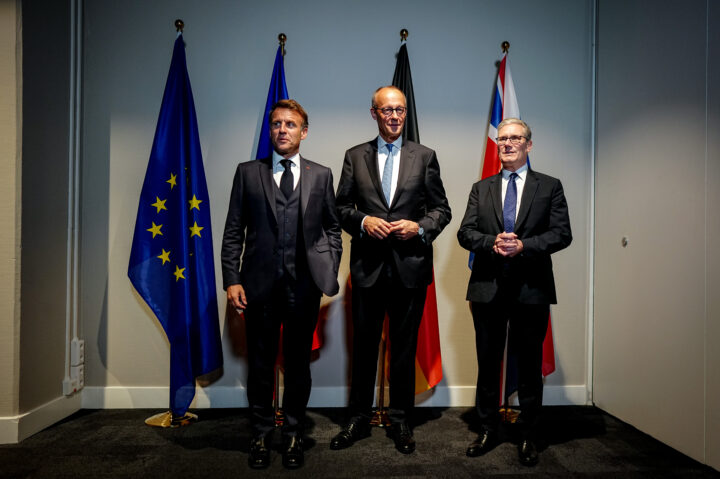
Kay Nietfeld/picture alliance via Getty Images
French President Emmanuel Macron (l-r), German Chancellor Friedrich Merz (CDU) and Keir Starmer, Prime Minister of Great Britain, meet in The Hague at the delegation hotel on the sidelines of the NATO summit for trilateral talks in the E3 format.
France, Germany and the U.K. are poised to reinstate snapback sanctions on Iran in the next several days, after talks held in Geneva this week aimed at scaling back Iran’s nuclear program reportedly concluded with little progress.
The three countries — known as the E3 — sent a letter to the U.N. Security Council earlier this month outlining “ongoing concerns regarding the lack of assurances as to the exclusively peaceful nature of Iran’s nuclear program” and Tehran’s ongoing violations of the 2015 Joint Comprehensive Plan of Action, to which the E3 countries are still parties despite the U.S. withdrawal in 2018.
The countries threatened to reinstate snapback sanctions by the end of August 2025 if “no satisfactory resolution” to the issue was reached before then.
The mechanism to trigger snapback sanctions at the UNSC expires in October, at which point any attempt to adopt new UNSC sanctions could face vetoes from Russia and China. However, the E3 and U.S. are looking to start the process before Russia assumes the UNSC presidency in October, giving it the power to delay the imposition of snapback sanctions — a process that takes 30 days to complete — until its expiration date.
The foreign ministers of the E3 and Iran met in Geneva earlier this week to discuss a diplomatic solution that would see Iran roll back its nuclear program without additional sanctions, which reportedly ended with little progress made.
A senior European diplomat told Axios on Wednesday that it would take a “diplomatic miracle” to prevent the reinstatement of snapback sanctions, with the European nations poised to trigger the mechanism as soon as Thursday.
Secretary of State Marco Rubio held a call with the E3 foreign ministers on Wednesday, during which all of the officials “reiterated their commitment to ensuring that Iran never develops or obtains a nuclear weapon,” State Department Principal Deputy Spokesperson Tommy Pigott said.
U.S. lawmakers have repeatedly pressed for the E3 to trigger the snapback mechanism.
Sen. Ricketts’ resolution intended to urge the U.K., France and Germany to impose snapback ‘as soon as possible’
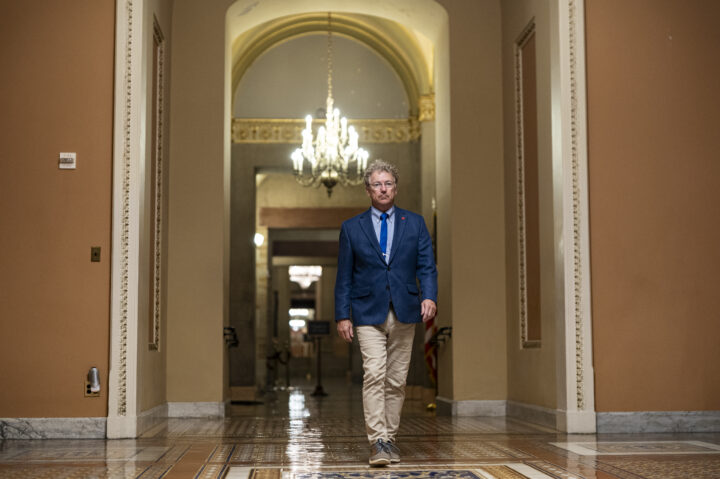
Al Drago/Getty Images
Sen. Rand Paul (R-KY) walks to the Senate floor during overnight votes at the U.S. Capitol on July 1, 2025 in Washington, DC.
Sen. Pete Ricketts (R-NE) attempted to call up and pass by unanimous consent a resolution urging the United Kingdom, France and Germany to trigger the snapback of United Nations sanctions on Iran under the Joint Comprehensive Plan of Action “as soon as possible,” but was blocked by Sen. Rand Paul (R-KY).
“In order to seize this moment,” and capitalize on Iranian weakness, “the U.S. and our allies must impose maximum pressure to the highest extent possible to force Iran to agree to permanently and verifiably end its nuclear program, including its capacity to enrich,” Ricketts said on the Senate floor on Wednesday.
The option to invoke snapback is set to expire in mid-October, but Ricketts emphasized that the process will take at least 30 days to complete, and that Russia is set to assume the presidency of the U.N. Security Council in October, in which role it could delay the proceedings. European allies have reportedly set an August deadline to initiate snapback, but Ricketts argued that “timeline … leaves little room for error.”
“I stand to urge our European friends to hold the line” in upcoming talks with Iran, Ricketts said, warning that Iran is trying to buy time and delay snapback.
Paul warned that the U.S. attack on Iran might make Iran more resistant to U.S. demands and “may turn out to be a disaster” that prompts Iran to sprint to a nuclear weapon.
He argued that sanctions have never changed Iran’s behavior — a notion disputed by leaders on both sides of the aisle — and “are often counterproductive” in general. Paul also suggested that the U.S. is in no position to make any requests related to snapback since President Donald Trump removed the U.S. from the Iran nuclear deal in 2018.
“It is a bit inconsistent for us to be arguing that Europe should apply and adhere to the JCPOA, which we no longer participate in,” Paul said. “If the United States is no longer a member of the JCPOA, what gives Washington the right to advise those who remain in it to invoke certain mechanisms within the agreement?”
He requested the Ricketts resolution be modified to instead call for deescalation and diplomacy.
Ricketts responded that diplomacy without pressure is a failed concept.
Sen. Jim Risch (R-ID), the chairman of the Senate Foreign Relations Committee, also spoke on the Senate floor in support of Ricketts’ resolution.
“Over the last 10 years, Iran has enjoyed unwarranted sanctions relief and time is short before the opportunity expires to snap back sanctions,” Risch said. “We cannot afford to wait until the end of August. Initiating the snapback process would be the right and long overdue move.”
Mechanism to bring back U.N. sanctions expires in October
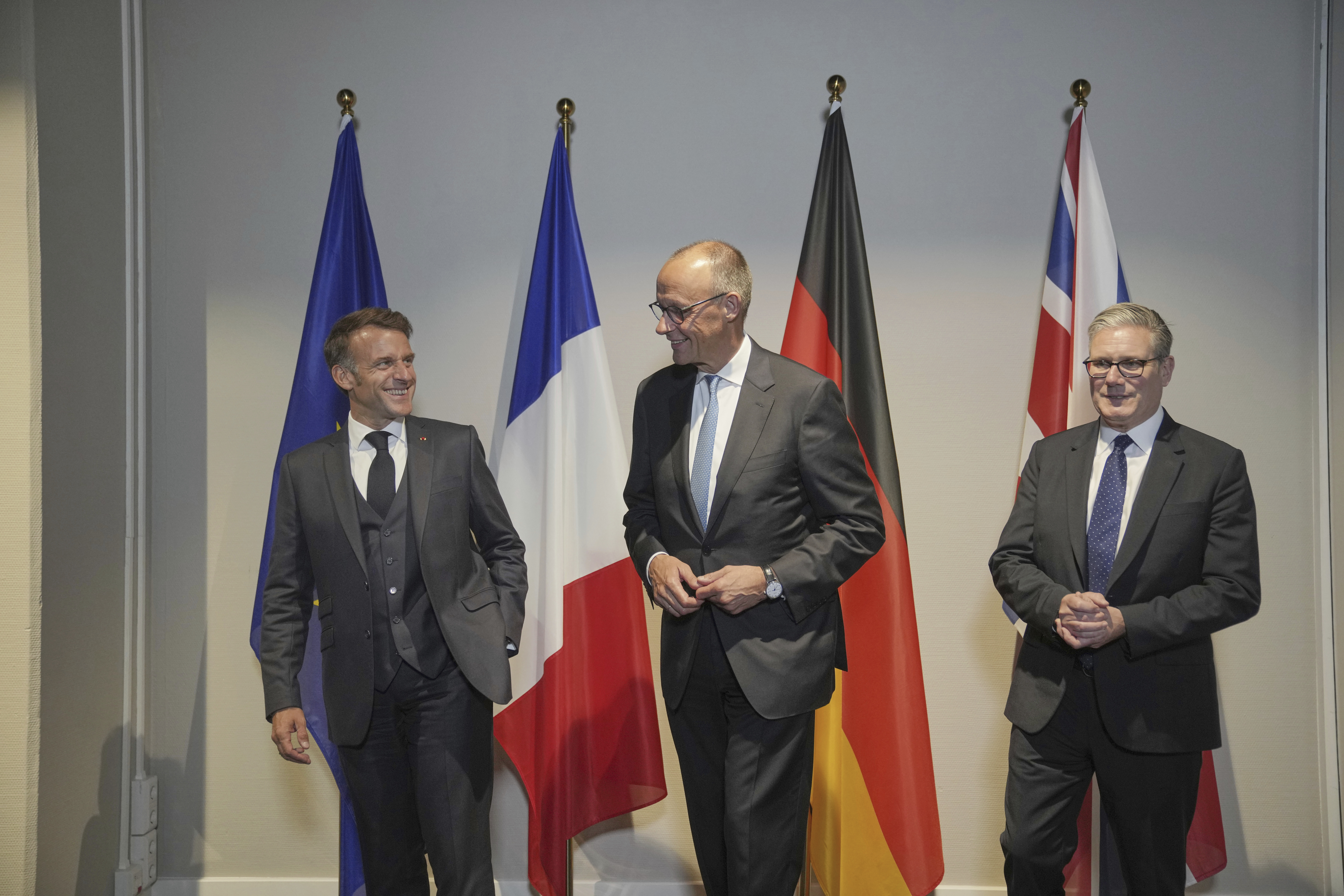
Press Association via AP Images
French President Emmanuel Macron, Germany's Chancellor Friedrich Merz and Prime Minister Sir Keir Starmer at a hotel prior to an E3 meeting on the sidelines of the NATO summit in The Hague, Netherlands, Tuesday June 24, 2025.
France, Germany and the U.K. will bring back sanctions on Iran via the U.N. Security Council if a nuclear deal is not reached by the end of August, French Foreign Minister Jean-Noel Barrot warned on Tuesday.
Barrot said that the E3, the European countries party to the 2015 Iran nuclear deal known as the Joint Comprehensive Plan of Action, will trigger the snapback mechanism, reimposing all U.N. sanctions, if a new agreement is not reached.
The Trump administration hopes to reach an agreement with the Islamic Republic to stop any uranium enrichment in Iran after Israeli and American strikes on Iran’s nuclear sites last month, aiming to prevent Tehran from rebuilding its severely damaged nuclear program.
“France and its partners are … justified in reapplying global embargoes on arms, banks and nuclear equipment that were lifted 10 years ago,” Barrot said on the way to a meeting with EU foreign ministers in Brussels. “Without a firm, tangible and verifiable commitment from Iran, we will do so by the end of August at the latest.”
The snapback mechanism expires in October and takes 30 days to activate, such that the end of August is the last chance to impose U.N. sanctions that cannot be vetoed by Russia and China, Iran’s allies on the Security Council. Moscow is slated to assume the presidency of the U.N. Security Council in October and could try to obstruct the move if it is not completed before then.
The E3 reached the shared policy in a phone call with Secretary of State Marco Rubio on Monday, according to Axios.
Barrot’s statement also came after reports in Arabic and Iranian media that Germany planned to activate snapback sanctions this week, which the German Foreign Ministry denied to Jewish Insider. A German official confirmed that his country shares France’s position.
Earlier this week, Tehran threatened a “proportionate and appropriate response” if the E3 snaps back sanctions, a move Iranian Foreign Ministry Spokesman Esmaeil Baqaei claimed “lacks any legal, political or moral justification.”
“European parties are constantly trying to use it as a tool in violation of their fundamental obligations,” he added.




























































